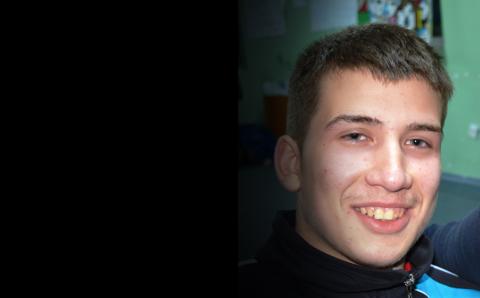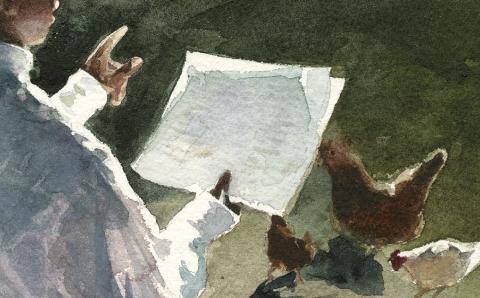What is it like to parent a son or daughter with disabilities? Here are a few thoughts from one father of an adult daughter who lives joyfully with severe, multiple disabilities.
Life-changing. Kids change your life; that’s only more so for parents who raise children who have disabilities. Sometimes the change hits severely and painfully. Author and speaker Emily Colson writes that shortly after her son Max was diagnosed with autism, her husband left her. Our daughter, Nicole, who is 29, was born extremely prematurely and experienced many complications after birth. God used her to guide both my wife, Bev, and me into the callings we have today. I served in parish ministry for 17 years, and now serve the Christian Reformed Church as the director of Disability Concerns. Bev was a German teacher, and now teaches special education.
Lonely and isolating. As far as other parents are concerned, parents of kids with disabilities are odd. Here are a few examples. For a while, we grieved over the child we had hoped for who never came, while we learned to love this child with disabilities that God give us. We sometimes wondered whether others saw our child as a problem to be solved rather than as a person whom God has endowed with a personality and gifts and preferences and hopes and dreams. When Nicole was born, some people dropped out of our lives because they didn’t know how to cope with the reality of her multiple disabilities. Other people reached out to us and were Jesus to us with their loving words, caring visits, and helping hands. A friend, now in his 80s, told me that he was thankful that his daughter, who had severe disabilities, passed away before him. That’s odd, because most parents want their kids to outlive them, but he loved his daughter so much that he was willing to live with pain of outliving her so that he could ensure good care for her from the beginning of her life to its end. A few times people asked Bev and me what it was like to parent Nicole, and then they listened. Their listening helped push away some of the isolation.
Discovering a new normal. When Nicole was about a year old, she needed monitors, tube feedings, oxygen, and many medicines. She was missing developmental milestones. Life was challenging for us. One day at dinner, I wiped my bearded face with a napkin. Nicole giggled at the scratchy sound. So I wiped again. More giggling. Before long, all three of us were belly laughing. As Bev and I let go of the child we had hoped for and came to love the girl God had given us, we began to discover a new normal. Some things we could never have imagined doing, such as “bagging” Nicole during the times she stopped breathing, became a normal part of our lives. In contrast to the people who told us that we were special parents because we had Nicole, we have done what any loving parent will do normally by God’s grace.
Feeling judged. People frequently judge children and adults with disabilities (and their parents) negatively. Jesus’ disciples did that when they asked him, “Who sinned, this man or his parents, that he was born blind?” (John 9:2) Some parents have faced the difficult situation that their child with a disability was not welcome at the Christian school which their other children attended. Parents can feel judged when their child has a meltdown in public, or when a well-meaning stranger asks to pray over their daughter who uses a wheelchair. Some children make sounds during worship, and others stare at what they consider a disruption. One time, a person told me that Nicole lives with disabilities because my wife and I don’t have enough faith. On our worst days, we judge ourselves and wonder whether such an accusation is true.
Advocating. Most kids with disabilities are seen by an army of specialists who want to help. Medicine schedules, therapy routines, doctor visits, therapist appointments, individual educational plan meetings all have to be juggled by their parents. We had to learn a new vocabulary and understand education, insurance, therapy, and medical systems. Church leaders may have no idea how to engage a child or youth with disabilities in church programs. Given all these challenges, parents advocate with doctors, teachers, therapists, and people at church to bring about the best outcomes for their child.
Surprising gifts. Nicole doesn’t have the kinds of gifts church leaders usually look for. She’ll never teach a Sunday school class, serve as a deacon, or sing in the praise team—but she loves to worship. One Sunday morning we began singing, “What can wash away my sin, nothing but the blood of Jesus.” Those old, familiar words can be taken for granted, but no one did that morning. As we began to sing, Nicole shook her hands in the air and let out a loud whoop—not your typical Christian Reformed worship behavior, but she didn’t care. She reminded all of us how good it was to worship the God who washes away all our sins through the blood of Jesus. Nicole doesn’t worry about the future or fret about the past; she’s a master at living in the moment. Nicole models a rich faith in God and in other people. She trusts that people will love and take care of her and that God will too.
Wondering about the future. When a child with a disability is young, parents wonder whether developmental milestones will be delayed or missed entirely. As the child grows into adulthood, they wonder who will assist him or her once they are unable to do so. Like my 80-something friend, many parents have the strange and painful hope that they will outlive their children. Sadly, that’s quite likely, especially for people with severe disabilities. We might outlive Nicole too, and we thank God for the hope of eternal life that she has through Jesus Christ.
Hoping for belonging. Dr. John Swinton wrote, “To be included, you just need to be present. To belong, you need to be missed.” Friendships, jobs, and education do not come easily for most people with disabilities. That’s why the church is so important. Wouldn’t it be great, as Dr. Erik Carter says, if Sunday were “the best day of the week for families who have children with disabilities”? That happens in some churches, but not all. Why not do all you can to make it true for your church?
Thanking God. Bev and I would not have chosen the path Nicole has had to walk, but we thank God for our precious daughter and for the ways he has used her to help us grow to be more like Jesus. God brought her into the world with a particular calling, and she is fulfilling that calling well. Nicole is exactly the person God planned her to be (1 Cor. 12:18). God knew that we, our family, our church, and our community need her in order to fully be the body of Christ.
About the Author
Mark Stephenson is the director of Disability Concerns.









